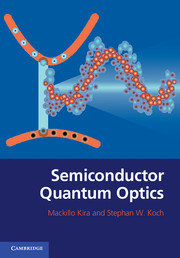Book contents
- Frontmatter
- Contents
- Preface
- 1 Central concepts in classical mechanics
- 2 Central concepts in classical electromagnetism
- 3 Central concepts in quantum mechanics
- 4 Central concepts in stationary quantum theory
- 5 Central concepts in measurement theory
- 6 Wigner's phase-space representation
- 7 Hamiltonian formulation of classical electrodynamics
- 8 System Hamiltonian of classical electrodynamics
- 9 System Hamiltonian in the generalized Coulomb gauge
- 10 Quantization of light and matter
- 11 Quasiparticles in semiconductors
- 12 Band structure of solids
- 13 Interactions in semiconductors
- 14 Generic quantum dynamics
- 15 Cluster-expansion representation of the quantum dynamics
- 16 Simple many-body systems
- 17 Hierarchy problem for dipole systems
- 18 Two-level approximation for optical transitions
- 19 Self-consistent extension of the two-level approach
- 20 Dissipative extension of the two-level approach
- 21 Quantum-optical extension of the two-level approach
- 22 Quantum dynamics of two-level system
- 23 Spectroscopy and quantum-optical correlations
- 24 General aspects of semiconductor optics
- 25 Introductory semiconductor optics
- 26 Maxwell-semiconductor Bloch equations
- 27 Coherent vs. incoherent excitons
- 28 Semiconductor luminescence equations
- 29 Many-body aspects of excitonic luminescence
- 30 Advanced semiconductor quantum optics
- Appendix Conservation laws for the transfer matrix
- Index
- References
1 - Central concepts in classical mechanics
Published online by Cambridge University Press: 05 January 2012
- Frontmatter
- Contents
- Preface
- 1 Central concepts in classical mechanics
- 2 Central concepts in classical electromagnetism
- 3 Central concepts in quantum mechanics
- 4 Central concepts in stationary quantum theory
- 5 Central concepts in measurement theory
- 6 Wigner's phase-space representation
- 7 Hamiltonian formulation of classical electrodynamics
- 8 System Hamiltonian of classical electrodynamics
- 9 System Hamiltonian in the generalized Coulomb gauge
- 10 Quantization of light and matter
- 11 Quasiparticles in semiconductors
- 12 Band structure of solids
- 13 Interactions in semiconductors
- 14 Generic quantum dynamics
- 15 Cluster-expansion representation of the quantum dynamics
- 16 Simple many-body systems
- 17 Hierarchy problem for dipole systems
- 18 Two-level approximation for optical transitions
- 19 Self-consistent extension of the two-level approach
- 20 Dissipative extension of the two-level approach
- 21 Quantum-optical extension of the two-level approach
- 22 Quantum dynamics of two-level system
- 23 Spectroscopy and quantum-optical correlations
- 24 General aspects of semiconductor optics
- 25 Introductory semiconductor optics
- 26 Maxwell-semiconductor Bloch equations
- 27 Coherent vs. incoherent excitons
- 28 Semiconductor luminescence equations
- 29 Many-body aspects of excitonic luminescence
- 30 Advanced semiconductor quantum optics
- Appendix Conservation laws for the transfer matrix
- Index
- References
Summary
Historically, the scientific exploration of new phenomena has often been guided by systematic studies of observations, i.e., experimentally verifiable facts, which can be used as the basis to construct the underlying physical laws. As the apex of the investigations, one tries to identify the minimal set of fundamental assumptions – referred to as the axioms – needed to describe correctly the experimental observations. Even though the axioms form the basis to predict the system's behavior completely, they themselves have no rigorous derivation or interpretation. Thus, the axioms must be viewed as the elementary postulates that allow us to formulate a systematic description of the studied system based on well-defined logical reasoning. Even though it might seem unsatisfactory that axioms cannot be “derived,” one has to acknowledge the paramount power of well-postulated axioms to predict even the most exotic effects. As is well known, the theory of classical mechanics can be constructed using only the three Newtonian axioms. On this basis, an infinite variety of phenomena can be explained, ranging from the cyclic planetary motion all the way to the classical chaos.
In this book, we are mainly interested in understanding how the axioms of classical and quantum mechanics can be applied to obtain a systematic description for the phenomena of interest. Especially, we want to understand how many-particle systems can be modeled, how quantum features of light emerge, and how these two aspects can be combined and utilized to explore new intriguing phenomena in semiconductor quantum optics.
- Type
- Chapter
- Information
- Semiconductor Quantum Optics , pp. 1 - 25Publisher: Cambridge University PressPrint publication year: 2011

